|
|
|
|
There’s been a notable change in the tenor of conversations I’ve had with acquaintances when talking about the weather this summer. With a season marked by punishing heat and damaging floods in the U.S. and in other countries, the phrase “climate change” seems to be coming to people’s lips far quicker than it did in years past. It’s a reflection, I think, of people’s realization that global warming isn’t about the future but increasingly about our present.
Our environment and climate team has delivered a number of stories that provide you with not only the latest science but also the societal dimensions of extreme weather.
A perennial question for anybody intent on losing weight is how much to emphasize diet versus exercise. UCLA biobehavioral scientist Donald M. Lamkin digs into a number of rigorous studies that have examined the complex interplay between the two. In the end, he concludes that exercise has several health benefits but that people shouldn’t count on “outrunning a bad diet.” “There is a diminishing marginal return to exercise – you eventually take less weight off for the additional exercise you put in,” he writes.
The latest advances in biotechnology raise a number of challenging questions, and ground zero for those debates is often in assisted reproductive technologies. This article combines the views of Michigan State University developmental biologist Keith Latham and University of Virginia bioethicist Mary Faith Marshall to provide a tour of some of the issues these emerging procedures are raising and ways that society can begin to deal with them.
Also in this week’s science news:
If there’s a subject you’d like our team of science editors to investigate, please reply to this email.
|

|
Martin LaMonica
Director of Editorial Projects and Newsletters
|
|
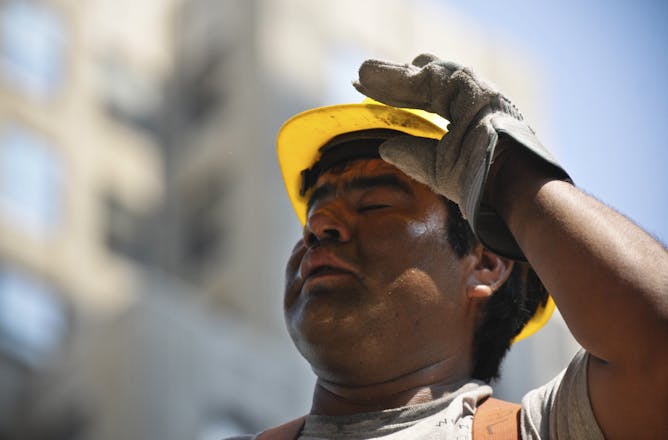
Outdoor workers face higher risks on hot, humid days.
AP Photo/Swoan Parker
W. Larry Kenney, Penn State; Daniel Vecellio, Penn State; Rachel Cottle, Penn State; S. Tony Wolf, Penn State
The biggest risks aren’t always the biggest numbers on the thermometer – humidity gets dangerous faster than many people realize.
|
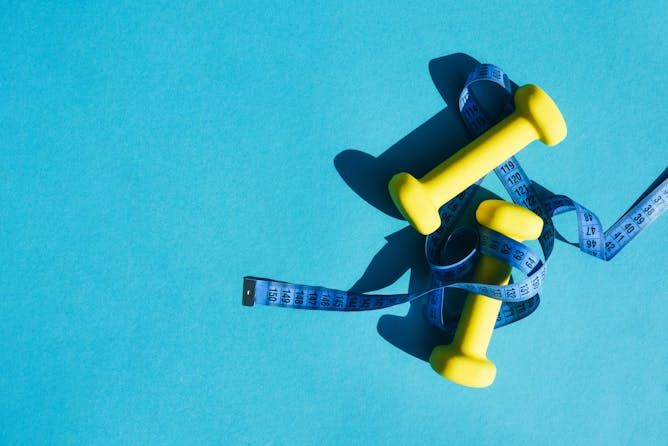
There isn’t a debate, however, on the health benefits of regular exercise.
Maryna Terletska/Moment via Getty Images
Donald M. Lamkin, University of California, Los Angeles
Some researchers assert that the body responds to exercise by burning fewer calories when you’re not working out. Regardless of its effects on weight loss, exercise provides many health benefits.
|
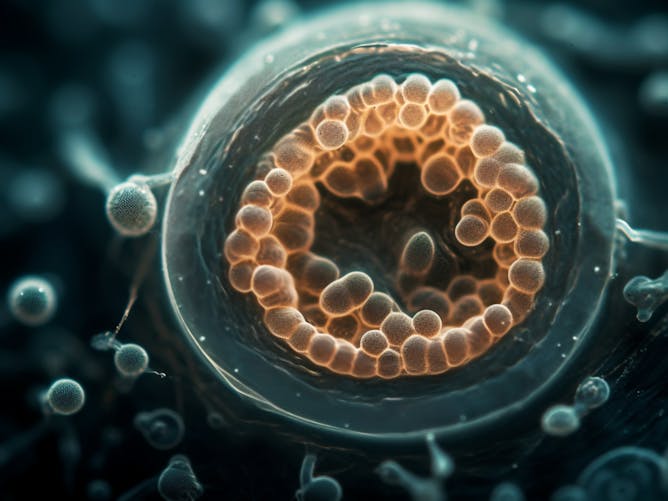
A few days after successful fertilization, an embryo becomes a rapidly dividing ball of cells called a blastocyst.
Juan Gaertner/Science Photo Library via Getty Images
Keith Latham, Michigan State University; Mary Faith Marshall, University of Virginia
Scientists can create viable eggs from two male mice. In the wake of CRISPR controversies and restrictive abortion laws, two experts start a dialogue on ethical research in reproductive biology.
|
|
|
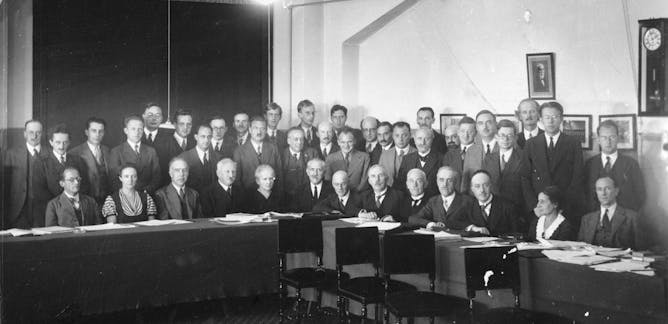
Carl Kurlander, University of Pittsburgh; Chandralekha Singh, University of Pittsburgh
The trailer for ‘Oppenheimer’ fails to include female physicists, which is indicative of a broader media trend that, if reversed, could lead to greater gender diversity in science.
| |
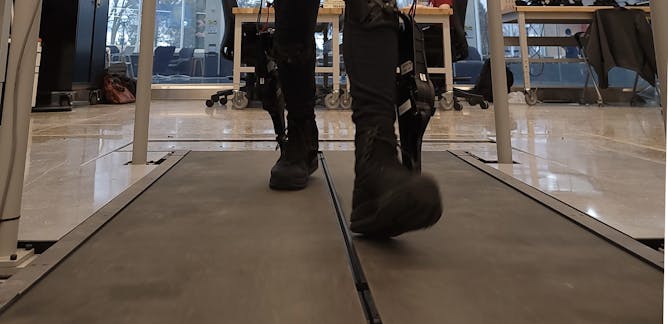
Elliott Rouse, University of Michigan
Asking users the dollar value of the costs and benefits of walking in exoskeletons is a better way of finding out how users feel about them than measuring calories saved.
|
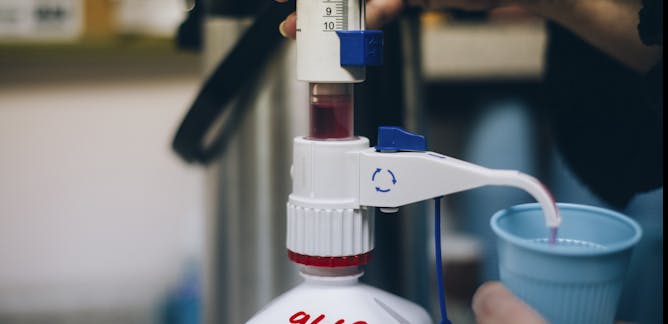
Melissa S. Fry, Indiana University; Melissa Cyders, Indiana University
Prescription medications can help people with opioid use disorder avoid the risks of relapse and overdose. But stigma based on misperceptions about addiction limits their use.
| |
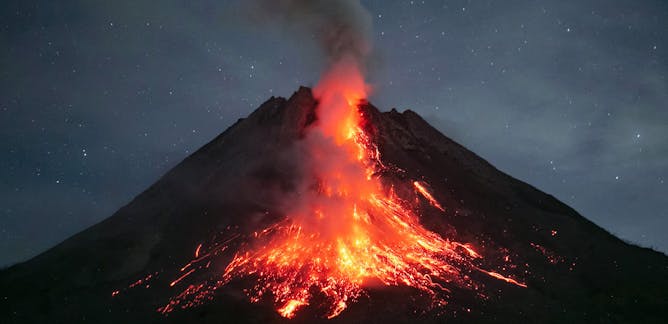
David Kitchen, University of Richmond
For some people, it’s a choice based on cultural beliefs or economic opportunities provided by the volcano. Other times it’s less a choice than the only option.
|
|
|
|
|
-
Andrea K. Gerlak, University of Arizona; Burke Griggs, Washburn University; Gabriel Filippelli, Indiana University; Rosalyn R. LaPier, University of Illinois at Urbana-Champaign
A webinar hosted by The Conversation brings together experts in law, health, policy and Indigenous affairs to explain some of the most pressing problems related to water in the US.
-
Emilio Ferrara, University of Southern California
Creating bias-free AI systems is easier said than done. A computer scientist explains how controlling bias could lead to fairer AI.
-
Michael Richmond, Rochester Institute of Technology
Some people incorrectly say the Moon landings didn’t happen. But the evidence – and logic – isn’t on their side.
-
Christopher Faires, Iowa State University; Robert Overstreet, Iowa State University
Returns cost companies billions of dollars in lost sales. They also generate emissions and packaging waste. Two logistics experts offer some tips from psychology for more sustainable returns.
-
Lauryn Stafford, University of Washington; Liane Ong, University of Washington
Diabetes rates across the world have been rising steadily since the early 1990s, when this data was first estimated. That trend is only going up.
-
Christopher Schwartz, Rochester Institute of Technology
AI can manipulate a real event or invent one from thin air to create a ‘situation deepfake.’ These deepfakes threaten to influence upcoming elections, but you can still protect your vote.
|
|
|
|
|
| | |
| | |
| |
| |
| |
|
|
|